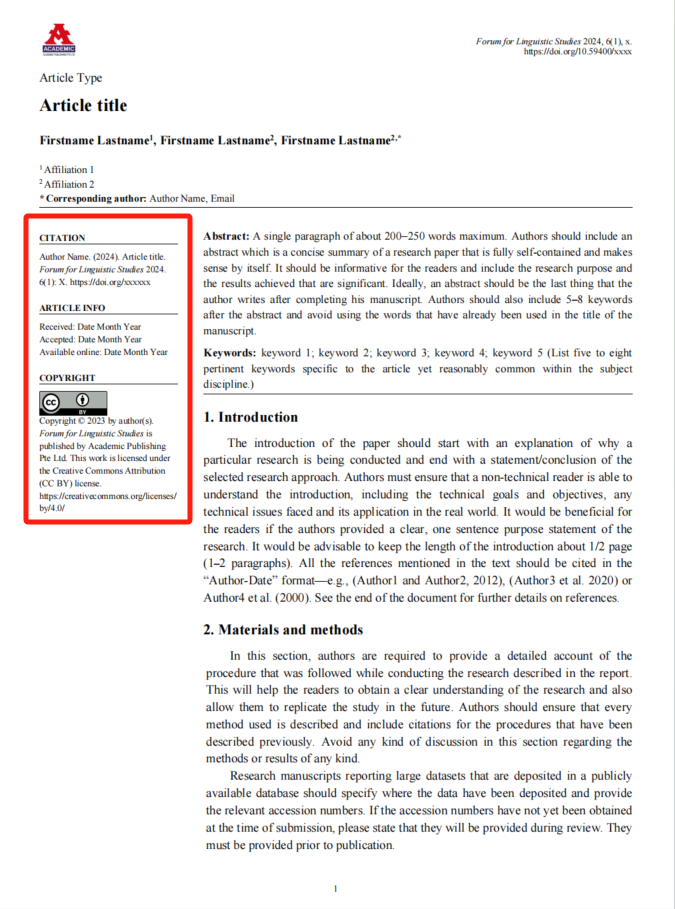Vol 6, No 2 (2024)
Table of Contents
|
Article
by Dai Tao, Lin Siew Eng
Forum Linguist. Stud.
2024
,
6(2);
doi: 10.59400/fls.v6i2.2135
822 Views,
574 PDF Downloads
Translation assessment, referring to evaluating various aspects related to translation, is crucial to the improvement of translation competence and quality. This study, taking valid papers on translation assessment published in WoS core collection from 2000 to 2022 as research samples, visualizes and reviews the research theme, research evolutions and emerging hot topics of translation assessment through bibliometric analysis. The number of annual publications shows that despite the general growth, the number of articles on translation assessment fluctuates from year to year. By Cite Space-based analysis of keywords co-occurrence, keyword clustering, time zone and burst detection, it finds that translation assessment mainly covers five themes, namely translation competence, translation quality, machine translation, translation teaching and training, and others. The overall evolution has been a gradual shift from concepts, metrics and evaluations of topics related to translation assessment into a topic of in-depth and interdisciplinary study. The hotspots in recent years include translation competence acquisition, neural machine translation and translation quality estimation. The findings reveal research evolutions and hot spots, propose implications for further translation assessment research and provide references for scholars who are interested in this topic. |
|
Article
by Jerusha Angelene Christabel Godwin, Shilaja C. L.
Forum Linguist. Stud.
2024
,
6(2);
doi: 10.59400/fls.v6i2.2107
503 Views,
300 PDF Downloads
This study delves into the unique narrative style of graphic novelist Sarnath Banerjee, focusing on his depiction of post-colonial identity in a modern, multilingual Indian context. It examines how Banerjee utilizes both phonetic elements and text to express this theme. Contrary to the perception of comics as trivial, this paper argues that they effectively blend visual and verbal elements, creating multimodal texts where various semiotic elements contribute significantly to meaning-making. Banerjee’s work, characterized as rhizomatic, employs a hybrid symbolic system to navigate the complex postmodern and postcolonial landscape of India. He does so through the use of symbolic, emblematic, and indexical features, which are integral in articulating these societal tensions. |
|
Article
by Mahboobeh Khaleghi, Mohammad Saleem, Mozaffar Mansoor, Mohammad Abdul Wajid
Forum Linguist. Stud.
2024
,
6(2);
doi: 10.59400/fls.v6i2.2077
774 Views,
194 PDF Downloads
The present research is a qualitative study investigating a potential relationship between explicit grammar instruction to adult EFL (English as a Foreign Language) learners and the development of their writing skill. Communicative Language Teaching (CLT) approach discourages explicit teaching of grammar at all levels as the theoretical premise in the approach is that learners are capable of imbibing grammar rules implicit in communication. However, adult EFL learners, taught English through CLT as an approach, are observed to make grammar errors in their writing, though they made progress in spoken English. In a qualitative study conducted with premedical students at a university in Saudi Arabia, the researchers find that explicit teaching of a few difficult-to-grasp grammar rules is required to improve learners’ writing skill since academic writing requires an advanced knowledge of grammar. A comparative analysis of learners’ writing samples and spoken English transcriptions showed that learners made numerous grammatical errors in their writings while the same group of learners made satisfactory progress in oral communication in English, despite making a few accent errors. The findings of the present research suggest that concerned EFL teachers need to make accommodations for grammar within communicative approach to explain certain grammar points explicitly, especially to adult learners, to take care of their writing skill, along with developing their communicative skills. |
|
Article
by Asaad Qahtan Najm Aljanabi, Ahmed Sahib Jabir
Forum Linguist. Stud.
2024
,
6(2);
doi: 10.59400/fls.v6i2.1879
291 Views,
148 PDF Downloads
This paper is going to investigate the defamatory statements that are posted on social media platforms and those statements are considered as a language crime that is usually recognized as a linguistic act. Defamatory statements can be expressed in different ways, including written and spoken words, gestures, or other ways of communication. Consequently, persons who defame others usually base their speech on the words and expressions that constitute their accusation. This paper aims to analyze the language of defamatory messages, which must not only be false but also transmitted to other individuals with the intent of causing harm to the reputation of the targeted person. It also describes how linguists can provide help in defamation cases by applying Shuy’s model to investigate the linguistic tools of speech acts, grammatical referencing, discourse structure, malicious language, and the conveyed and intended meaning of the defamatory messages. The data, which are cases, have been collected from The Criminal Court and The Femidemora Court in Babylon. |
|
Article
by Minjie Chen, Guojie Yin, Wei Lun Wong, Mohamad Syafiq Ya Shak, Mairas Abdul Rahman, Mei Chew Lee
Forum Linguist. Stud.
2024
,
6(2);
doi: 10.59400/fls.v6i2.2130
362 Views,
192 PDF Downloads
The updated version of the national English curriculum for compulsory education was released in 2022. In this updated version, phonics was also required. Although studies about phonics were uprising again after the release of the new curriculum, most of the previous studies did not specify phonics instruction approach or obtain a larger sample size. Besides, previous studies called for a school-based phonics instructional material to enhance English as a foreign language (EFL) beginners’ word recognition ability at word level. To bridge the gap, the researchers compiled a phonics instructional material based on synthetic phonics approach in light of the new national English curriculum and bottom-up reading model. To evaluate the effectiveness of such a phonics material, a number of 366 EFL students from three strata across two schools participated in this quasi-experiment via stratified random sampling technique. They experienced a pre-test, 16 weeks of training via the phonics material, a post-test as well as a delayed retention test, which was held three months later. The results of both independent t-test and paired samples t-test have indicated that the newly compiled phonics material can improve EFL students’ word recognition ability up to 50% and that the knowledge was well-retained after a period of time as practices went on. The results have further implied that to better implement phonics instruction and to radically improve EFL students’ reading ability, the solution might be to assign time in the extra-curriculum service to teach phonics via explicit and systematic synthetic phonics instruction tailored according to the school-based phonics material. |
|
Article
by Nabiyya Zarbali, Suroso Suroso, Kastam Syamsi
Forum Linguist. Stud.
2024
,
6(2);
doi: 10.59400/fls.v6i2.2137
366 Views,
216 PDF Downloads
This study examines the issue of first language interference in spoken and written Indonesian by Azerbaijani students who are taking an Indonesian language course at Azerbaijan University of Languages. The study is framed within the context of bilingualism, where first language interference occurs when individuals learn a foreign language. The aim of this research is to identify the types and causes of interference displayed by Azerbaijani-speaking students when using Indonesian language, with a focus on speaking and writing during classroom activities. A descriptive qualitative approach was used to collect data through observation and documentation, including oral recordings and written assignments. Analysis revealed that Azerbaijani students face pronunciation, morphology, and syntax challenges due to interference based on Weinreich’s theory. Pronunciation challenges arise from the lack of the phonetic sound [ê] in Azerbaijani, resulting in substitutions with [é]. Morphological complexities arise from the unfamiliarity with prefixes in Azerbaijani, making it difficult to transform active sentences into passive structures. Syntactic challenges arise due to the differing sentence structures between Azerbaijani (S-O-P-C) and Indonesian (S-P-O-C). To mitigate interference, it is recommended to include targeted phonological drills, increased morphological exercises, and enhanced syntactic practice to facilitate a smoother language acquisition journey for Azerbaijani students who are mastering Indonesian language. |
Announcements
FLS platform migrated |
|
Due to a system upgrade, the platform of Forum for Linguistic Studies has been migrated. Please access the new website at https://ojs.acad-pub.com/index.php/FLS and make submissions. For previous submissions to the old system, authors can still track the review process here. |
|
| Posted: 2024-03-13 | |
The new submission template for 2024 is now available online |
|
We have revised the layout for articles to be published in the new issues, starting from 2024 Volume 6 Issue 2. As of today, the article templates available for download on ‘Author Guidelines’ pages have been updated. The blank column on the left runs through all pages in an article. The revised layout was applied in the article pictured below, to serve as an example:
|
|
| Posted: 2023-12-05 | |
Publisher Changed |
|
Forum for Linguistic Studies (ISSN: 2705-0602) has been transferred from Whioce Publishing Pte. Ltd. to Academic Publishing Pte. Ltd. It will be published by Academic Publishing Pte. Ltd. from Volume 5, Issue 1 (2023). The publication frequency will also be changed to quarterly since Volume 5 Issue 2. Hence, we will publish three issues this year. |
|
| Posted: 2023-06-26 | |
| More Announcements... |






_%E5%89%AF%E6%9C%AC1.png)

